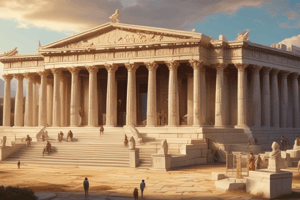Podcast
Questions and Answers
What was the primary function of the Ekklesia in Athenian democracy?
What was the primary function of the Ekklesia in Athenian democracy?
- Preparing issues for discussion in the Assembly
- Voting on laws, deciding on war and peace, and electing rulers (correct)
- Carrying out the decisions of the Assembly as officials
- Commanding the army and navy
How were members of the Boule, or Council of 500, selected in ancient Athens?
How were members of the Boule, or Council of 500, selected in ancient Athens?
- Chosen by ballot (correct)
- Selected by the strategoi
- Appointed by the Ekklesia
- Inherited positions
Which group of individuals was responsible for commanding the army and navy in ancient Athens?
Which group of individuals was responsible for commanding the army and navy in ancient Athens?
- The strategoi (correct)
- The Magistrates
- The Ekklesia
- The Boule
What is the meaning of 'democracy' according to the text?
What is the meaning of 'democracy' according to the text?
During which period did the Classical period, known for the prominence of Athens and Sparta, primarily develop?
During which period did the Classical period, known for the prominence of Athens and Sparta, primarily develop?
Which of the following groups were excluded from participating in politics in ancient Athens?
Which of the following groups were excluded from participating in politics in ancient Athens?
How often were the law courts officials elected in ancient Athens?
How often were the law courts officials elected in ancient Athens?
What was the age requirement for citizens to be part of the Ekklesia in Athens?
What was the age requirement for citizens to be part of the Ekklesia in Athens?
What was the size of the Boule (Council) in ancient Athens?
What was the size of the Boule (Council) in ancient Athens?
In which century BC did some poleis introduce democracy?
In which century BC did some poleis introduce democracy?
Flashcards
Classical Period
Classical Period
The Classical period developed during the 5th century BC and the first half of the 4th century BC. It is known for the superiority of Athens and Sparta and for a series of wars.
Democracy
Democracy
A system of government where the people hold the power.
The Ekklesia (Assembly)
The Ekklesia (Assembly)
The most important political body in Athens, it voted on laws, decided on war and peace and elected the rulers.
The Boule (Council of 500)
The Boule (Council of 500)
Signup and view all the flashcards
Magistrates
Magistrates
Signup and view all the flashcards
Strategoi
Strategoi
Signup and view all the flashcards
Law Courts
Law Courts
Signup and view all the flashcards
Study Notes
- The Classical period occurred during the 5th century BC and the first half of the 4th century BC
- The period is known for the superiority of Athens and Sparta
- The period is also known for a series of wars
Athenian Democracy
- In the 6th century BC, some poleis introduced democracy, meaning "government by the people"
- Athens was the best example of a democratic polis
- Only male citizens could participate in politics, excluding women, slaves, and foreigners from citizenship
Institutions in Athens
- The Ekklesia, or Assembly, was the most important political body
- The Ekklesia voted on laws, decided on war and peace, and elected the rulers
- The Ekklesia was made up of all Athenian citizens over the age of 20
- The Boule, or Council of 500, prepared the issues to be discussed in the Assembly
- The Boule was made up of 500 citizens over the age of 30
- The members of the Boule were chosen by ballot
- Magistrates were officials who carried out the decisions of the Assembly
- The ten strategoi commanded the army and navy and were important magistrates
- Law courts were elected each year by ballot
Studying That Suits You
Use AI to generate personalized quizzes and flashcards to suit your learning preferences.



